Americans have strong opinions.
And now with President Trump – who ran an antiestablishment and populist campaign to win the White House – set to give a speech to a joint session of Congress this Tuesday, we’re taking a look at how they view some of the big issues facing the country, as well as the major institutions that make up American political and civic life.
The “General Social Survey,” a project of the independent research organization NORC at the University of Chicago, has been tracking several aspects of American life since 1972. Business Insider looked at the results of several survey questions about Americans’ views on social issues, confidence in institutions, and federal-spending priorities between the 1970s and 2014, the most recent year for which data is available.
Here’s how those attitudes have changed over the past four decades.
Overall happiness has been surprisingly stable over the past four decades. The proportion of Americans saying they're 'not too happy' has mostly hovered in the low teens.

Support for gun permits — a common form of mild gun control — has been broadly popular, though support has steadily dropped since the late '90s.

Meanwhile, gun ownership among Americans has been on the decline since the '70s. About half of households had a gun in 1970; under a third reported gun ownership in 2014.
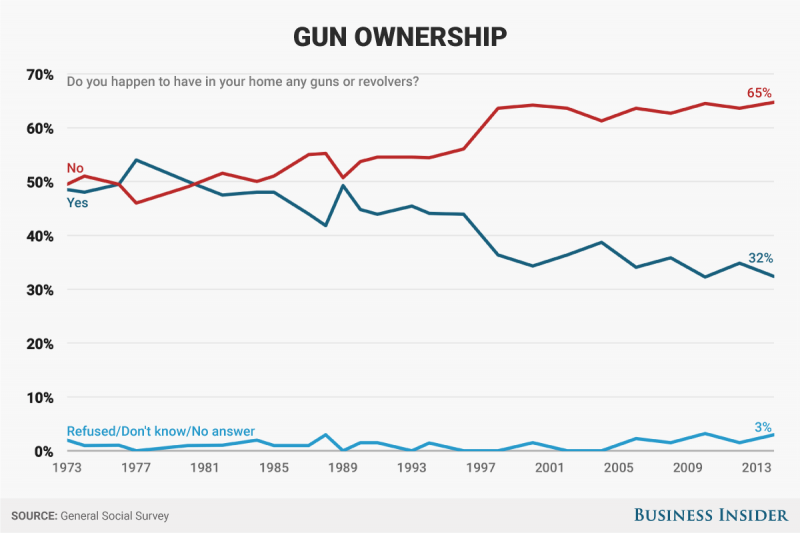
More Americans oppose a completely unrestricted right to abortion for any reason than support this right, although levels of support have slowly grown over the decades.
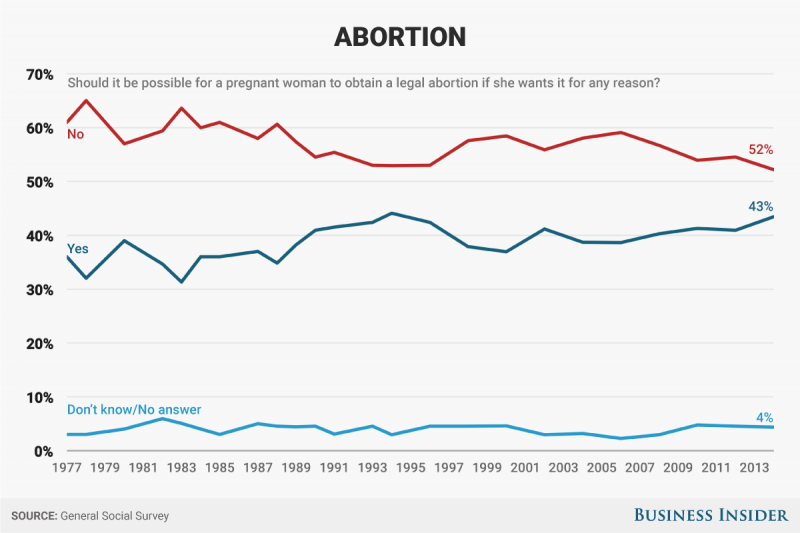
Americans mostly think that courts aren't harsh enough on criminals, though that sentiment has softened since crime peaked in the mid-'90s.

Americans feel safe in their neighborhoods. Similar to views on courts and criminals, the proportion of respondents who said they felt safe walking alone near their homes at night has steadily increased since the '90s.

Americans have reversed their views on marijuana legalization over the past several decades. In 1973, only about one in five respondents said the drug should be legal, increasing to a majority in 2014.
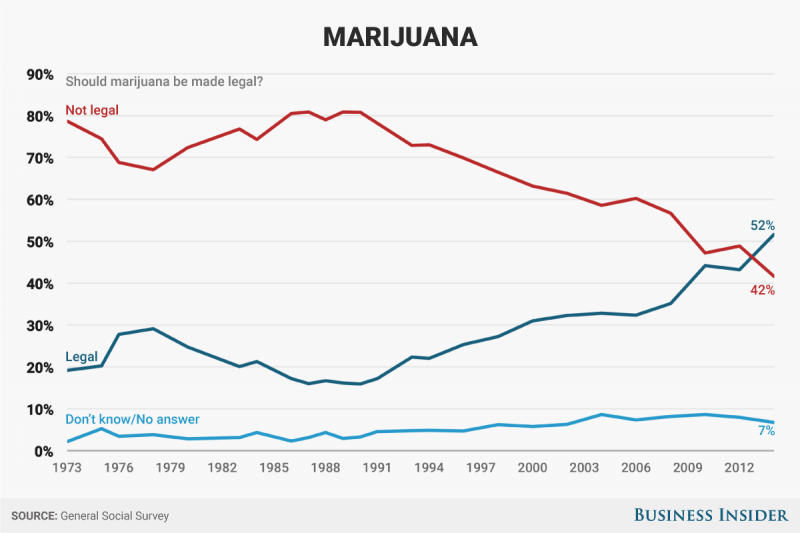
Americans have pretty strong opinions about various parts of federal spending. Highway and road spending has been popular for decades.

Americans are broadly favorable toward other forms of transportation infrastructure. Just 9% of respondents in 2014 thought we were spending too much on mass transit.
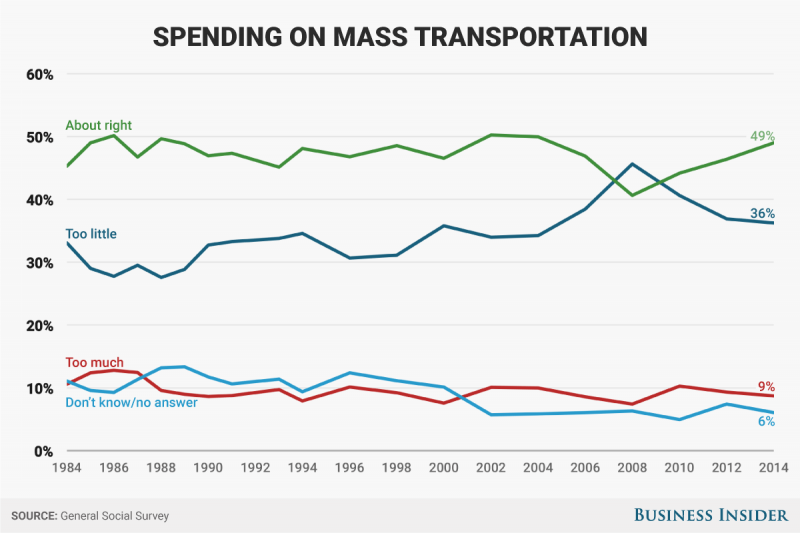
Americans like spending on Social Security. In 2014, a majority of respondents said the federal government is spending too little on the retirement program.

Americans overwhelmingly think the education system is underfunded, and the proportion of people who think we're spending too little has been increasing since the '70s.
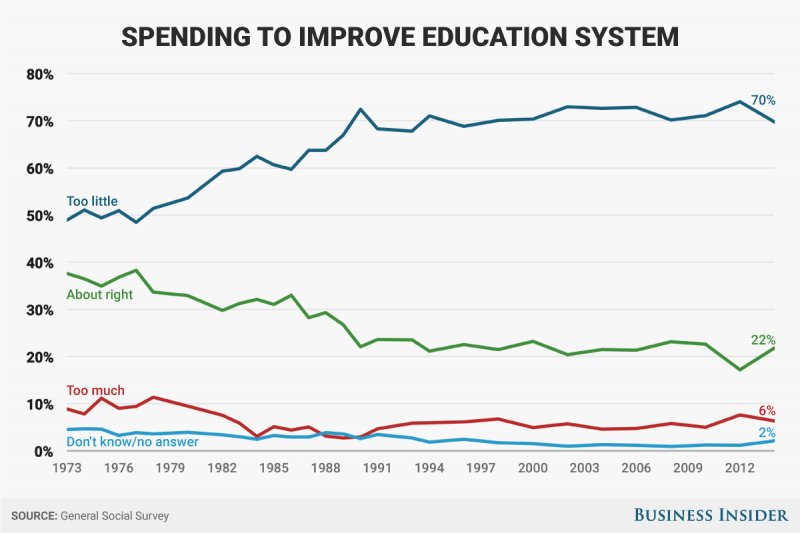
Americans think we aren't spending enough on environmental protection. In 2014, 57% of respondents said we spent too little on it.

Americans generally want to spend more on healthcare. Interestingly, there was an uptick in the share of respondents who said that we spend too much on health, starting in 2010 and coinciding with the passage of the Affordable Care Act, aka Obamacare.
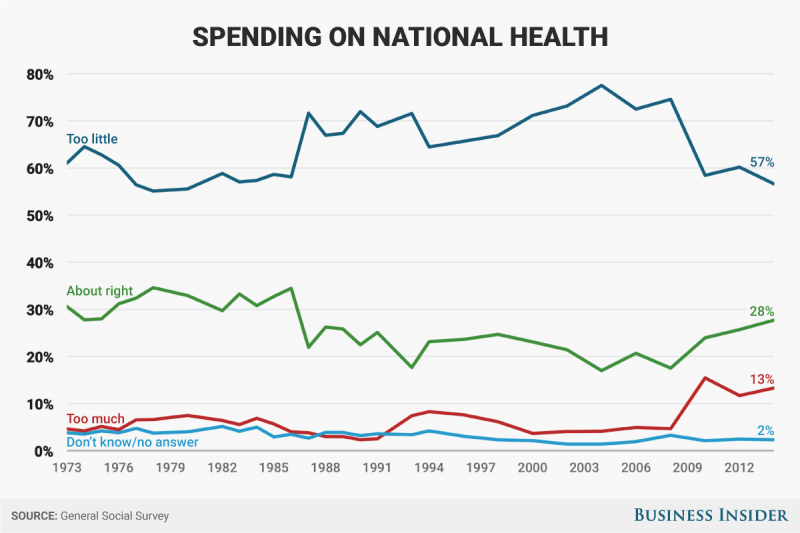
Americans also think we should spend more on dealing with drug addiction. In 2014, 57% of respondents thought we were spending too little on the problem.
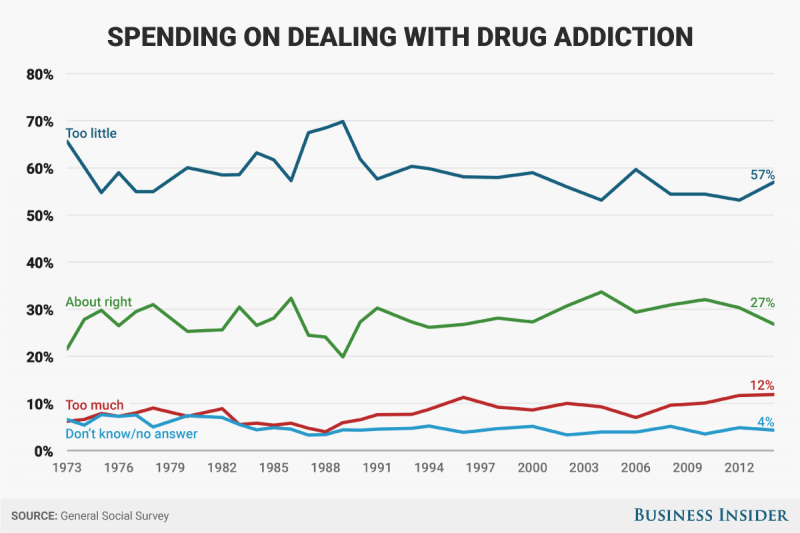
While a large majority of Americans still think we spend too little on fighting crime, the share of people holding that view has dropped with falling crime rates since the '90s.

Americans think the government should spend more on the problems of big cities, though like some other entries, this sentiment peaked in the mid-'90s as crime began to fall.

Other programs are less popular. A plurality of Americans have, for decades, thought the government spends too much on welfare, though there was a big drop-off in that sentiment after the 1996 welfare-reform bill.
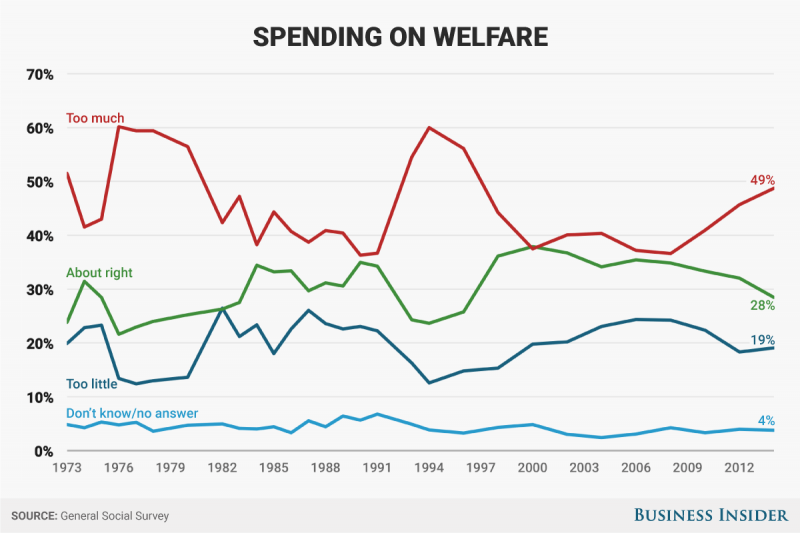
Americans have mixed feelings about spending on space exploration. When this question was first asked on this survey in the mid-'70s, NASA was wrapping up the immensely expensive Apollo moon-exploration program, coinciding with a majority belief that the government was spending too much, which has since subsided.

Americans perennially believe that the federal government spends too much on foreign aid, and that shows up in the survey. Interestingly, foreign-aid spending is relatively tiny, coming in at around 1% of the federal budget.

Source on foreign-aid-budget share: PolitiFact
Views on military spending ebb and flow with political developments. There was a huge uptick in the share of Americans saying we spent too little on defense in 1980, coinciding with the robustly pro-military Reagan campaign. By 2006 and 2008, as the Iraq War's popularity was collapsing, a plurality of Americans said we spent too much on the military.

Confidence in various American institutions varies wildly. Confidence in the executive branch of the government appears to spike in wartime, with bumps in the proportion of Americans having 'a great deal' of confidence during the 1991 Gulf War and after 9/11.
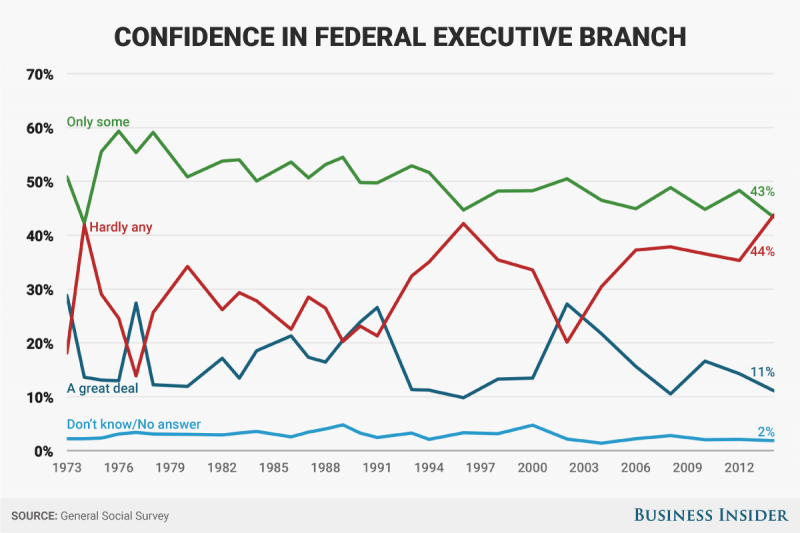
Meanwhile, Americans' confidence in Congress has plummeted since the '70s. By 2014, an outright majority of Americans said they had 'hardly any' confidence in the legislative branch.

Americans' confidence in the Supreme Court has been somewhat more steady, though the percentage of Americans with 'a great deal' of confidence in the court has fallen in the 21st century.

The military has consistently been more popular than the three civilian branches of government. The proportion of Americans with 'hardly any' confidence in the armed forces has been below 20% for the entire life of the survey. During the Gulf War and since 9/11, the most common response to this question was having 'a great deal' of confidence.
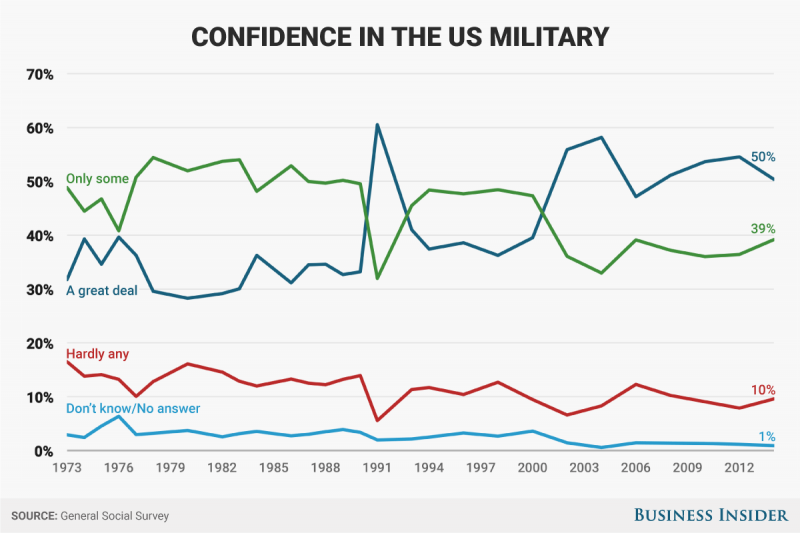
Americans' confidence in banks and other financial institutions suffers during times of economic hurt. More Americans expressed 'hardly any' confidence than 'a great deal' of confidence in financial institutions during the relatively mild recession of the early '90s and especially since the 2008 financial crisis and Great Recession.
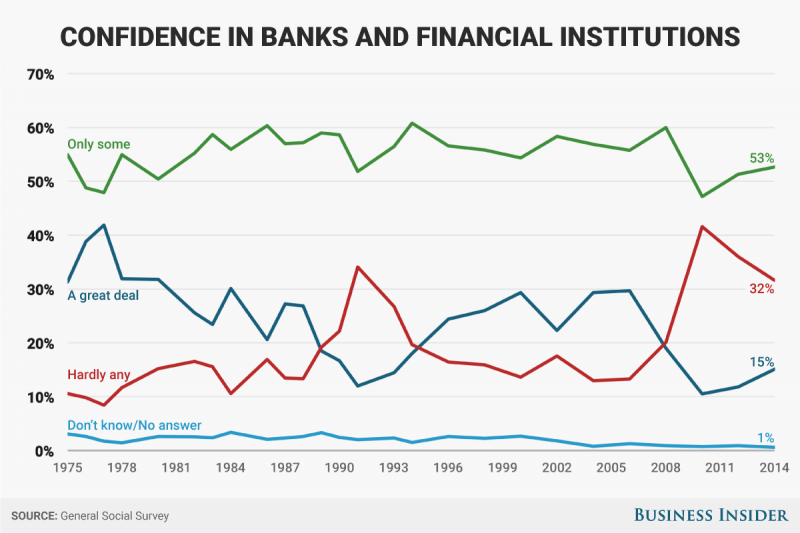
Most Americans have had 'only some' confidence in major companies since the 1970s. After the financial crisis, more Americans expressed 'hardly any' confidence in big business than 'a great deal' of confidence.
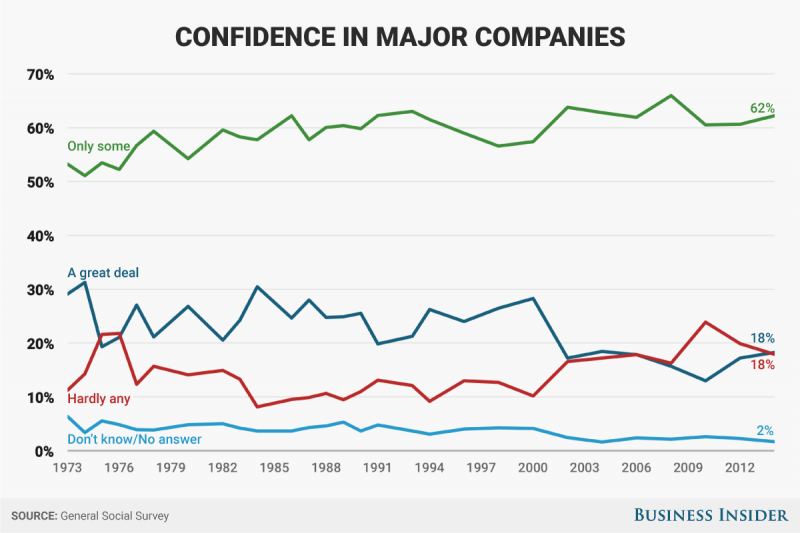
Americans are somewhat less likely to have strong feelings about unions than other major institutions. In 2000, a full 10% of survey respondents said they didn't know or didn't answer when asked about their confidence in organized labor.

Americans are feeling less certain about religious leaders. Confidence in organized religion has steadily fallen over the decades. In 2014, 23% of Americans had 'hardly any' confidence, while just 19% had 'a great deal.'

Americans have consistently respected the scientific community since the 1970s. At no point in the history of the survey has the share of Americans with 'hardly any' confidence in that community been above single digits.

Similarly, confidence in medicine has been high, though the proportion of Americans with 'hardly any' confidence has been creeping up since the mid-'80s. That proportion stood at 12% in 2014.
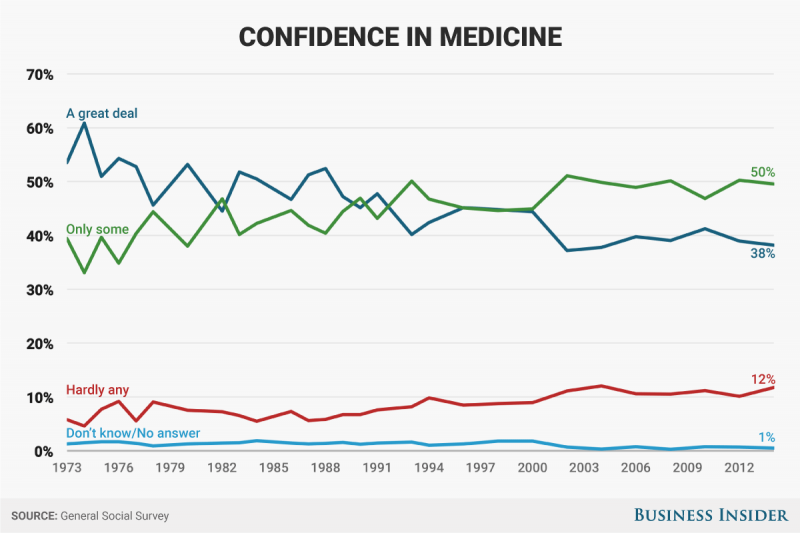
Confidence in education has been slightly lower. In 2014, 19% of Americans had 'hardly any' confidence, to 25% with 'a great deal' of confidence.
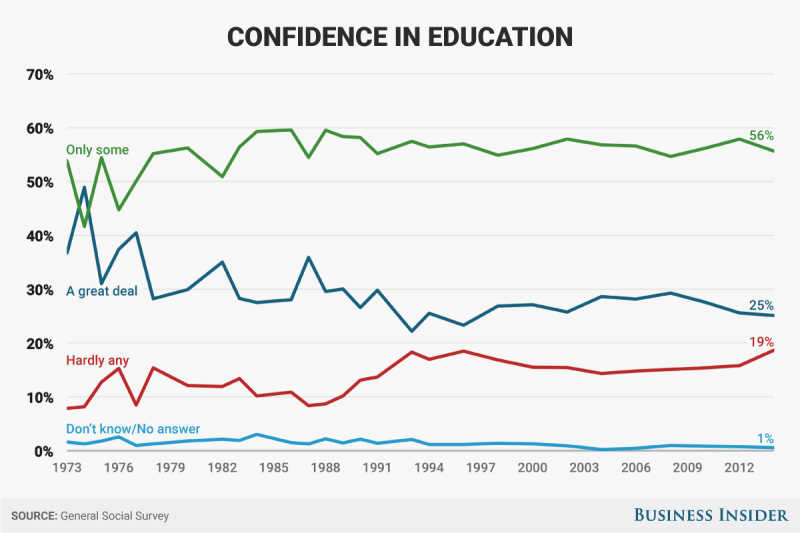
Americans do not trust the press, which is among the more unpopular national institutions. In 2014, 44% of Americans had 'hardly any' confidence in the press, while just 7% had 'a great deal.'

Similarly, Americans' confidence in TV is low: 41% of Americans had 'hardly any' confidence in 2014 and just 10% had 'a great deal' of confidence.

SEE ALSO: Here are the fastest-growing US states

